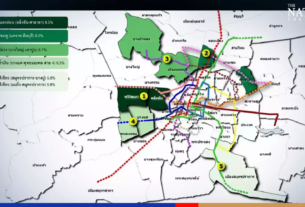DESPITE the sluggish economic growth in Thailand, General Electric says it continues to be upbeat about its business prospects in the Kingdom.
Kovit Kantapasara, president and chief executive of GE Thailand, Laos and Myanmar, said the company expected its sales in Thailand and Myanmar to expand by 40-50 per cent this year compared with 2014.
GE does not disclose its financial figures for each country.
In an exclusive interview with The Nation, Kovit said GE’s main focuses in Thailand included power generation and locomotives.
“We have been working on wind-power projects for the past few years and should have some breaking news soon,” he said.
GE is also bidding for contracts to supply larger gas-turbine units to the Electricity Generating Authority of Thailand (Egat) Bang Pakong and South Bangkok power plants. It is also looking for an opportunity to supply power turbines to Gulf Energy Development’s 5,000-megawatt IPP (independent power producer) plant once the project has been given the go-ahead and selects its technologies.
The US conglomerate is awaiting the Thai government’s decision on the fate of the country’s first batch of 25 SPP (small power producer) plants whose power purchase agreements with Egat are due to expire in April 2017.
Instead of building new SPP plants that cost US$1,200 (Bt43,000) per kilowatt capacity, Kovit said Thai authorities should opt for upgrading these old SPP plants, which would cost just $300-$350 per kilowatt.
GE announced this month that it had sealed a contract to supply six units of its latest aero-derivative gas turbine, the LM6000-PF+, to Gulf Energy Development, which is developing several gas-fired co-generation power projects with Japan’s Mitsui in Kabin Buri district of Prachin Buri province and in Nakhon Ratchasima province.
The company is also focusing on waste-to-energy power projects, and has to date supplied some 100 gas engines to the developers of such projects.
“With the lower oil prices, [producing electricity from] energy crops does not make sense,” Kovit said. “But producing power from municipal waste is a good policy. The government should offer a higher subsidy to municipal-waste power plants than to solar farms. Because municipal-waste projects are smaller, but are much more difficult to implement, they are very good for the environment.”
Meanwhile, GE is still looking to supply new locomotives to the State Railway of Thailand, which recently awarded contracts to two Chinese companies, China CNR and CSR Corp.
Last year, GE also inked a purchase-and-leaseback contract with Nok Air that involved two new Bombardier Q400 NextGen turboprops.
Source: http://www.nationmultimedia.com/business/GE-expects-further-growth-in-Kingdom-30269253.html


